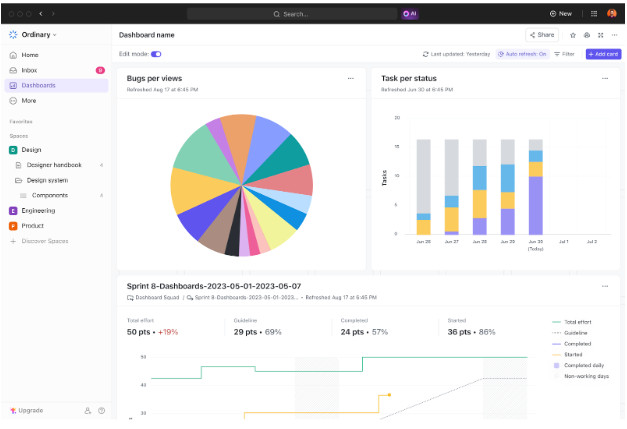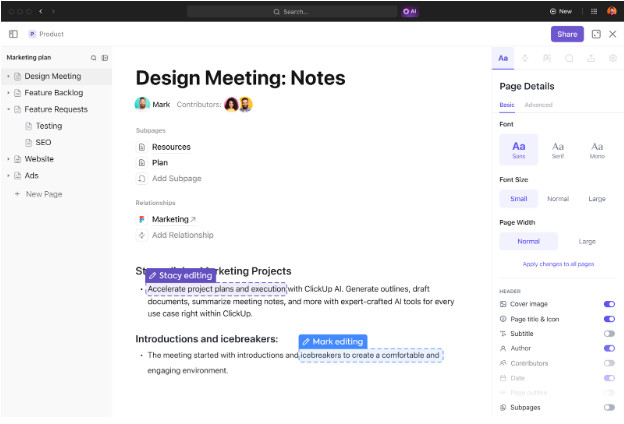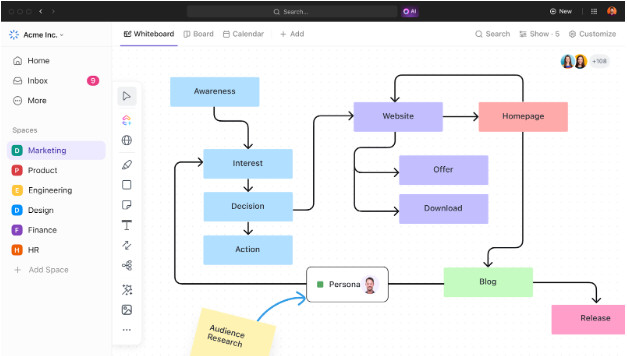
In a world overflowing with productivity tools, ClickUp boldly claims to be “one app to replace them all.” But does it truly deliver on that promise?
Whether you’re managing tasks solo or leading enterprise-level teams, this platform offers an impressive suite of features designed to help you plan, track, and collaborate—all in one place. In this comprehensive review, we dive deep into what makes it tick, where it shines, and who it’s really for.
What is ClickUp?
This is a cloud-based productivity platform that combines task management, docs, goal-setting, communication, time tracking, and more into a single app. It’s built to serve virtually every department—marketing, development, HR, finance, and beyond.
Launched in 2017, this software quickly gained a massive following thanks to its versatility, customizable interface, and aggressive approach to innovation. As a result, it has become a go-to tool for businesses seeking to consolidate their tech stack.
Key Features Breakdown
1. Task & Project Management
Create tasks, set due dates, assign priorities, and break them into checklists and subtasks. Moreover, you can organize work with folders, lists, and spaces—and customize everything to match your workflow.
2. Custom Views (15+ Layouts)
Choose from:
- List view
- Board (Kanban)
- Calendar
- Gantt
- Box (for workload)
- Mind Maps
- Table
- Timeline
Each user can pick their preferred view without affecting others. Consequently, teams can stay aligned while working in their own style.
3. Docs and Wikis
Write, edit, and collaborate on docs directly in the platform. You can link them to tasks, use slash commands, and even publish them publicly like a knowledge base or blog.
4. Goals and OKRs
Set measurable goals, track progress with targets, and link objectives directly to tasks. This feature is especially useful for teams using OKRs or KPI frameworks.
5. Whiteboards
Brainstorm visually using built-in digital whiteboards—ideal for planning sprints, user journeys, org charts, and flow diagrams. In fact, they’re perfect for mapping out big-picture strategies.
6. Automation
Save time with powerful no-code automations like:
- Changing statuses
- Assigning tasks
- Sending emails
- Triggering Slack messages
In addition, these automations reduce the need for manual updates and improve consistency.
7. Time Tracking & Estimations
Track time manually or with a built-in timer. Add time estimates, view workload balances, and generate reports for billing or capacity planning.
8. Integrated Chat and Comments
This tool replaces Slack for some teams with in-task comment threads and a built-in chat feature for real-time discussions. As a result, communication stays centralized.
9. Modular Add-Ons (ClickApps)
Turn on/off advanced features like Sprint Points, Dependencies, Relationships, Custom Fields, and more to keep your interface clean and focused.
10. Integrations
Connect with 1,000+ tools including:
- Google Drive
- Slack
- Zoom
- Microsoft Teams
- GitHub
- Notion
- Zapier
This broad integration ecosystem allows users to streamline their workflow without switching platforms.
11. Templates for Everything
From Agile sprints to content calendars, this software offers ready-made templates to help you get started fast—plus, you can create and reuse your own. In short, onboarding is quick and efficient.
Pricing (2025)
This solution remains one of the most feature-rich tools at its price point. Here’s a breakdown:
| Plan | Best For | Price |
| Free Forever | Solo users & small teams | $0 |
| Unlimited | Growing teams | $7/user/month |
| Business | Teams needing advanced features | $12/user/month |
| Enterprise | Complex orgs needing security & compliance | Custom pricing |
Pros
- All-in-one tool (tasks, docs, goals, whiteboards, time tracking)
- Highly customizable (interface, views, automations)
- Generous free plan
- Excellent for remote and async teams
- Strong support and frequent updates
- Replaces multiple tools like Trello, Slack, Docs, and GanttPro
Cons
- Slight learning curve for beginners
- Overwhelming if too many features are turned on
- Can be slower on large workspaces (although performance has improved)
- Mobile app is still catching up to desktop experience
Who Should Use It?
This tool is ideal for:
- Startups and fast-scaling teams that want one platform for everything
- Marketing and creative teams juggling many moving parts
- Software developers and Agile teams who want customizable sprint planning
- Freelancers and consultants who manage clients and track time
- Remote teams needing an all-in-one workspace
However, it may not be the best fit for:
- Users who want ultra-simple to-do lists with zero setup
- Teams already deeply embedded in tools like Jira or Confluence
Comparison with Competitors
| Feature | Clickup | Asana | Notion | Trello | Wrike |
| Custom Views | ✅ | ✅ | ❌ | ❌ | ✅ |
| Docs & Wiki | ✅ | ❌ | ✅ | ❌ | ✅ |
| Whiteboards | ✅ | ❌ | ❌ | ❌ | ✅ |
| Time Tracking | ✅ | ❌ | ❌ | ❌ | ✅ |
| Goal Setting | ✅ | ✅ | ❌ | ❌ | ✅ |
| Best For | All-in-one teams | Task management | Writing & wikis | Simplicity | Enterprise PM |
Final Verdict: Is It Worth It?
Absolutely—especially if you’re looking to replace a whole stack of productivity tools with one flexible platform.
This is not just a task manager. It’s a fully customizable, end-to-end work operating system. Whether you’re a freelancer or a 500-person company, it offers unmatched value for its price.
Start your free account now and see how much more productive your team can be.





